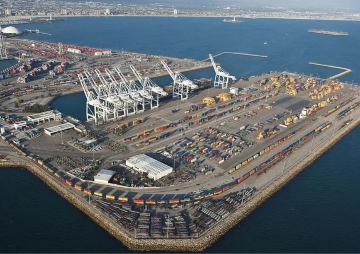Pakistan has not given up the use of terrorist groups like Jamaat-ud Dawa (JuD) to achieve its foreign policy objectives in India and Afghanistan, a policy which threatens to make Asia, and the world, more unsafe in the years to come. JuD, parent body of Lashkar-e-Tayyeba (LeT), is a highly organised, trans-national terrorist group based in Pakistan which has links not only with Pakistan Army and its intelligence agency,

Pakistan has not given up the use of terrorist groups like Jamaat-ud Dawa (JuD) to achieve its foreign policy objectives in India and Afghanistan, a policy which threatens to make Asia, and the world, more unsafe in the years to come. JuD, parent body of Lashkar-e-Tayyeba (LeT), is a highly organised, trans-national terrorist group based in Pakistan which has links not only with Pakistan Army and its intelligence agency, ISI, but also with the Taliban and al Qaida.
 The existence of LeT in Pakistan and the support it draws from the Army-ISI establishment seriously undermines the US-led Global War on Terror, argued Wilson John, Senior Fellow, ORF, at a presentation on the Radical Resurgence in Pakistan: A Case study of Jamaat-ud Dawa on September 5, 2008. The presentation was part of a two-day Seminar Series organised to celebrate the 19th Foundation Day of Observer Research Foundation.
The existence of LeT in Pakistan and the support it draws from the Army-ISI establishment seriously undermines the US-led Global War on Terror, argued Wilson John, Senior Fellow, ORF, at a presentation on the Radical Resurgence in Pakistan: A Case study of Jamaat-ud Dawa on September 5, 2008. The presentation was part of a two-day Seminar Series organised to celebrate the 19th Foundation Day of Observer Research Foundation.
The presentation, attended by some of the well-known experts on the subject, was based on a full-length study recently completed by the author. The meeting was chaired by Mr Vikram Sood, former Secretary, Research and Analysis Wing (RAW) and Vice President, ORF Centre for International Relations.
 A detailed profile of LeT founder, Hafiz Saeed, was presented to underline the reasons behind the setting up of the terrorist group and its virulent anti-India agenda. Saeed was quoted as stating that "many Muslim organisations are preaching and working on the missionary level inside and outside Pakistan, but they have given up the path of jehad altogether. The need for jehad has always existed and the present conditions demand it more than ever". His eight-point agenda for jehad, as articulated in a manifesto called Hum Jehad Kyon Karte Hain (Why do we do jehad?), was discussed to explain the terrorist group’s eight main objectives, one of which was to `` liberate Muslim territories under non-Muslim occupation``.
A detailed profile of LeT founder, Hafiz Saeed, was presented to underline the reasons behind the setting up of the terrorist group and its virulent anti-India agenda. Saeed was quoted as stating that "many Muslim organisations are preaching and working on the missionary level inside and outside Pakistan, but they have given up the path of jehad altogether. The need for jehad has always existed and the present conditions demand it more than ever". His eight-point agenda for jehad, as articulated in a manifesto called Hum Jehad Kyon Karte Hain (Why do we do jehad?), was discussed to explain the terrorist group’s eight main objectives, one of which was to `` liberate Muslim territories under non-Muslim occupation``.
 LeT’s involvement in Afghanistan and its growth in Pakistan after the Afghan Jehad was presented with great clarity. ``Within a decade of its existence, LeT expanded rapidly in Pakistan, setting up a sprawling headquarters in Muridke, and about 2200 offices across the country. Till its global ban in 2002, Muridke remained the nerve centre of the organisation where all its organisational, jehadi and educational activities were planned and carried out. The centre expanded to house, in addition to the existing facilities, a hospital, a market, a large residential area for the scholars and faculty members, a fish farm and agricultural tracts cultivated the year round. The centre was always heavily guarded with gunmen patrolling entry points round the clock``, according to the presentation.
LeT’s involvement in Afghanistan and its growth in Pakistan after the Afghan Jehad was presented with great clarity. ``Within a decade of its existence, LeT expanded rapidly in Pakistan, setting up a sprawling headquarters in Muridke, and about 2200 offices across the country. Till its global ban in 2002, Muridke remained the nerve centre of the organisation where all its organisational, jehadi and educational activities were planned and carried out. The centre expanded to house, in addition to the existing facilities, a hospital, a market, a large residential area for the scholars and faculty members, a fish farm and agricultural tracts cultivated the year round. The centre was always heavily guarded with gunmen patrolling entry points round the clock``, according to the presentation.
Besides these facilities, the group has also expanded its activities into charity and educational sector with the primary objective of increasing and sustaining its support within the civil society in Punjab and elsewhere in Pakistan. Today it runs over 150 secondary schools called al Dawa Schools with 20000 students, 11 madaris (seminaries), two science colleges, an ambulance service, mobile clinics and blood banks , besides a charity organisation called Idara Khidmat-e-Khalq, which played an important role in funnelling to the group relief funds meant for the victims of the October 2005 earthquake, which destroyed large parts of Pakistan Occupied Kashmir (PoK).
 In the recent years, the group has been working on buying properties in "every district’’ of Pakistan. After September 11, 2001, Hafiz Saeed shifted his headquarters to Jamia Masjid al-Qadsia at Chaubhurji in Lahore and bought property worth Rs 100 million in the Defence Housing Authority and Lake Road, Lahore. The group has also invested heavily in real estate in interior Sindh where its Markaz Mohammad bin Qasim campus near Shehdadopur was where the new recruits were sent after the Muridke campus came under global scanner.
In the recent years, the group has been working on buying properties in "every district’’ of Pakistan. After September 11, 2001, Hafiz Saeed shifted his headquarters to Jamia Masjid al-Qadsia at Chaubhurji in Lahore and bought property worth Rs 100 million in the Defence Housing Authority and Lake Road, Lahore. The group has also invested heavily in real estate in interior Sindh where its Markaz Mohammad bin Qasim campus near Shehdadopur was where the new recruits were sent after the Muridke campus came under global scanner.
The presentation dealt in detail the expansion of the group’s school system, including the recent setting up of an air-conditioned school in Karachi to attract the rich and elite of the society. The group’s recruitment and funding sources and patterns were highlighted to argue how the Pakistan government, and the international community, had allowed it to grow in the shadow of the trillion-dollar War on Terror. The presentation also brought out in detail the connection between LeT and AQ Khan, the infamous nuclear scientist who was accused of running a global network of nuclear smuggling. AQ Khan was a frequent visitor to LeT’s annual winter congregation at Muridke.
 The presentation concluded that `` the terrorist training camps today are manufacturing a new, 21st Century brand of jehadis, for whom fighting the kafirs or infidels is just the battle, not the war. They see themselves as the warriors in a global war to establish the supremacy of Islam over the world. These men, as they train, are patiently biding their time to replace the conventional institutions that support and sustain the Pakistani State – the pillars that have been crumbling rapidly due to avarice and apathy of the political leadership.``
The presentation concluded that `` the terrorist training camps today are manufacturing a new, 21st Century brand of jehadis, for whom fighting the kafirs or infidels is just the battle, not the war. They see themselves as the warriors in a global war to establish the supremacy of Islam over the world. These men, as they train, are patiently biding their time to replace the conventional institutions that support and sustain the Pakistani State – the pillars that have been crumbling rapidly due to avarice and apathy of the political leadership.``
Prof. Kalim Bahadur, noted Pakistan expert, and Lt. General V Patankar, Distinguished Fellow, ORF, spoke about Pakistan’s promotion of terrorist and extremist groups like LeT and the activities of such groups in Kashmir and other parts of India.
The views expressed above belong to the author(s). ORF research and analyses now available on Telegram! Click here to access our curated content — blogs, longforms and interviews.









 PREV
PREV

